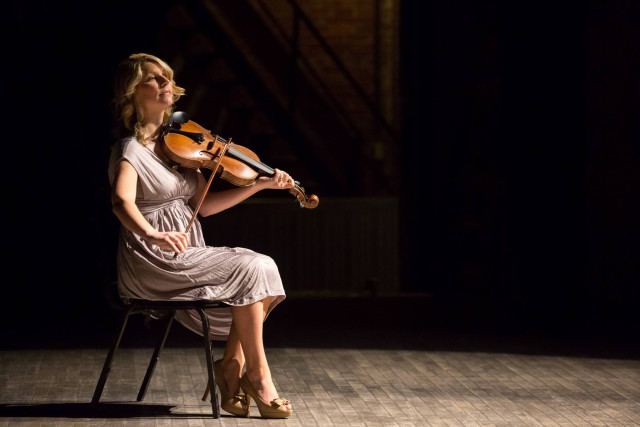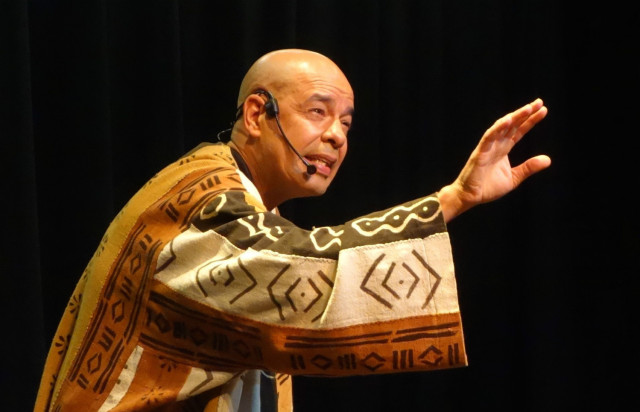Art students in grades 4–5 recently went on a field trip to the Portland Museum of Art. Docents expertly guided our students in the “Seeing Through Sketching” tour. Our students received several compliments from museum staff on how well-mannered and engaged they were. One docent said that she had never seen so many students focused on drawing at the same time!
Waynflete’s first-ever Community Celebration Night was a huge success!
The Waynflete community is enriched by cultural, religious, and spiritual diversity, as well as cross-age connections. To celebrate this, we held our first-ever Waynflete Community Celebration Night, an all-ages evening of offerings by local performers and food surrounding our different and shared traditions!
The evening was an incredible success. Students, parents and guardians, grandparents, alumni, faculty, and staff representing all divisions of the school were in attendance. Many students and adults remarked on how much they enjoyed the opportunity to connect and experience our community in this light.
Special thanks are due to our performers—Antonio Rocha, Clarisse Karasira and Mesa Schubeck, and Lauren Rioux and Isa Burke—for the engaging performances. The audience was captivated by the storytelling, music, and singing. We appreciate the efforts of the planning committee and many volunteers who brought this event to life. Thank you to Niyat Catering and to our community for all of the delicious food contributions.
We can’t wait to do it again next year!
Clarisse Karasira
Rwandan singer, songwriter, cultural dancer, and poet.
Lauren Rioux
Maine-born fiddler, violinist, educator, and Waynflete parent.
Antonio Rocha
Brazilian storyteller and performer, incorporates mime and spoken word.
The Outliers Robotics team wins at the NE District Granite State Event
Congratulations to the Outliers Robotics team for their recent victory at the NE District Granite State Event. They partnered with teams from Windham, NH and Lewiston, ME, and went undefeated in the playoffs—finishing only five points away from the world high score! The Outliers also won the Autonomous award for their consistent, reliable, high-performance robot operation during the autonomously managed actions. Their next event will be in the Greater Boston area from March 24–26.
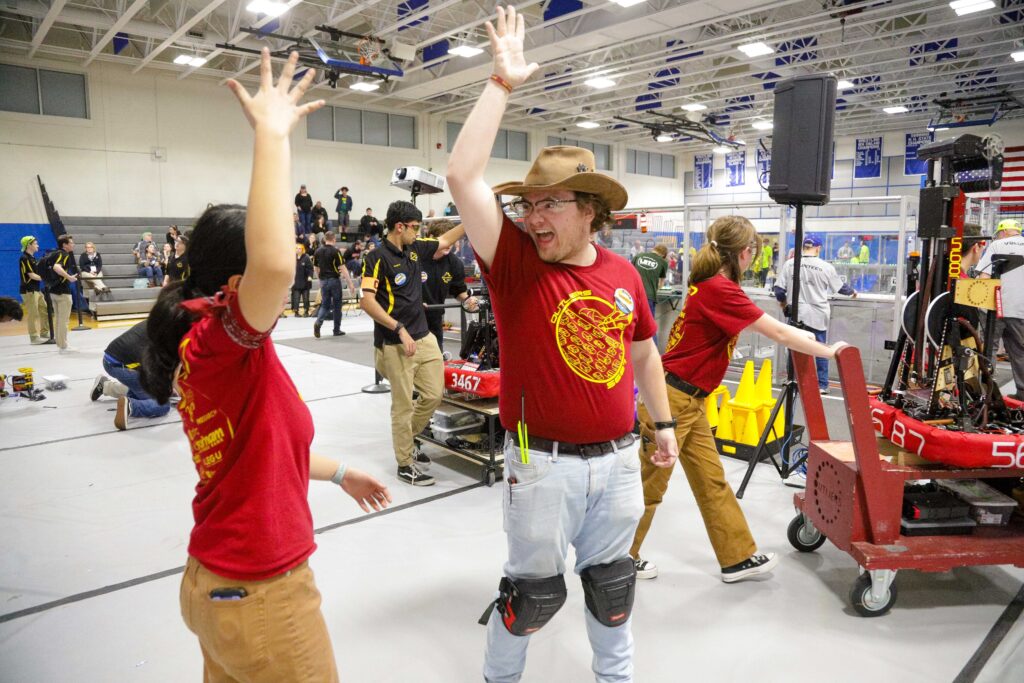
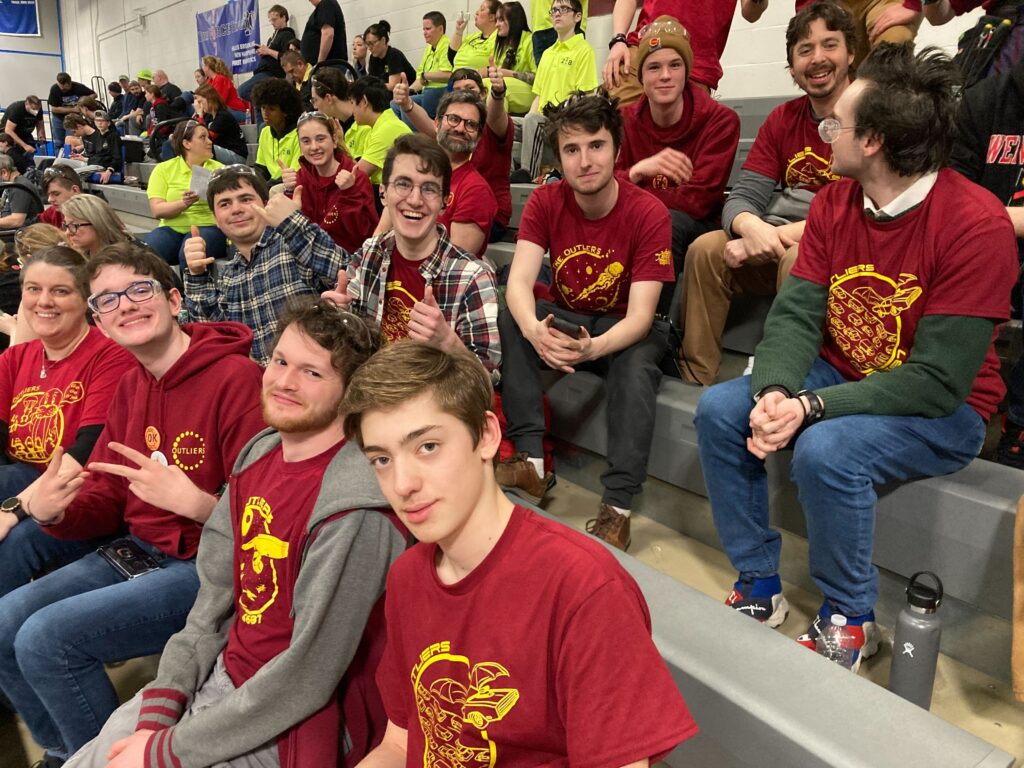
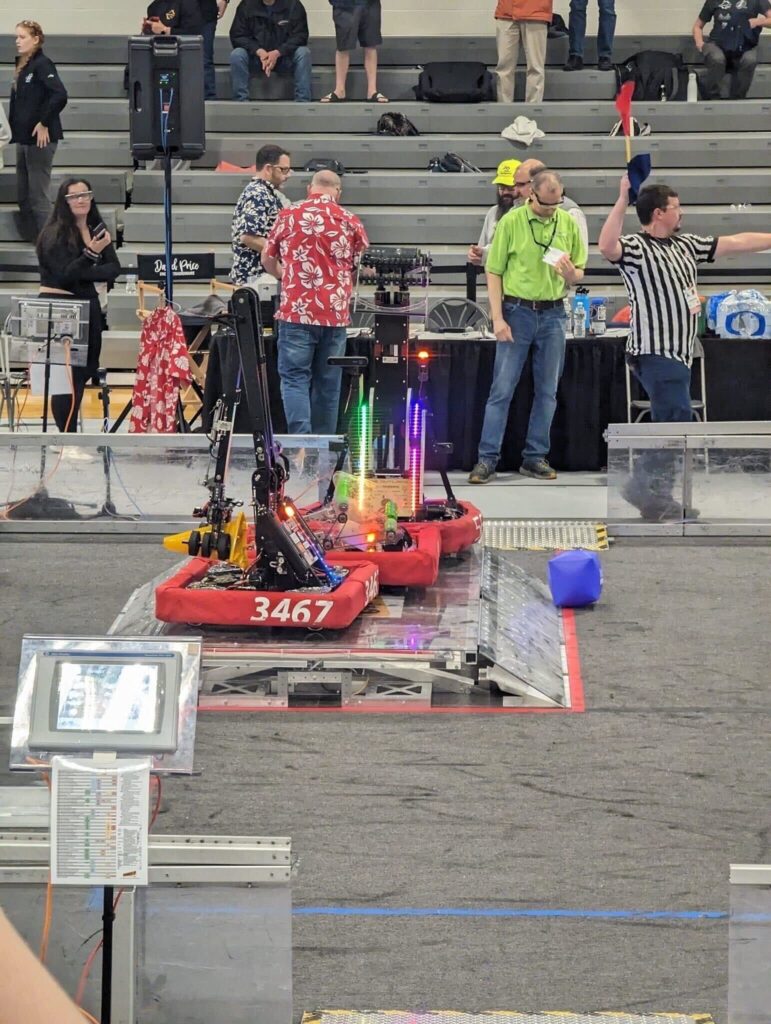
Upper School students compete in the Science Olympiad Tournament
Fifteen Upper School science students traveled to Brown University recently for an invitational Science Olympiad Tournament. Students competed with schools from across the country in 23 different science and engineering events, which ranged from building items like an electronic sensor to determine the mass of an object or a clock that can measure a specific time interval to tests of knowledge in fields such as astronomy, infectious diseases, and forensic science, to field tests such as tree and rock identification. The Waynflete team placed 12th out of 48 teams and earned five top ten finishes. Notable successes were a 6th-place finish in Detector Building by Orion Keierleber ’23 and Alec Benton ’24, a 7th-place finish in Write It Do It by Lydia Birkness ’25 and Kira Chown ’25, a 7th-place finish in It’s About Time by Maya Flores ’23 and Oscar Twining ’23, an 8th-place finish in Fermi Questions by Max Shurman ’24 and Alec Benton ’24, and a 10th-place finish in Flight by Maren Cooper ’23 and Reed Robinson ’23. Congratulations to all involved!
Portland Stage Company performs Shakespeare’s Julius Caesar for Middle School students
Portland Stage Company gave an abridged performance of Shakespeare’s Julius Caesar for the entire Middle School last week! Michael Dix Thomas ’02 directed the play, and Elliot Nye ’15 played Brutus. Theater 8 students participated in a director’s lab workshop after the show, where they explored tactics for persuasive speaking.
Marpheen Chann is the keynote speaker for this year’s New England Youth Identity Summit
The keynote speaker for the New England Youth Identity Summit on April 1 is Marpheen Chann—an author, writer, thinker, advocate, and speaker on social justice, equity, and inclusion.
As a gay, first-generation Asian American born in California to a Cambodian refugee family and later adopted by an evangelical, white working-class family in Maine, Marpheen uses a mix of humor and storytelling to help people view topics such as racism, xenophobia, and homophobia through an intersectional lens.
Marpheen lives in Portland, Maine. He works in the nonprofit and advocacy sector and holds a bachelor’s degree in Political Science from the University of Southern Maine and a law degree from the University of Maine School of Law.
Learn more about Marpheen and register for the Summit at waynflete.org/summit!

Speech and Debate team takes second place in Massachusetts debate competition
Congratulations to the Speech and Debate team on their impressive showing in Massachusetts this past weekend! Our four-person team competed against sixteen other schools in three rounds of Parliamentary Debate and ultimately finished in second place. Great job, Flyers!
Stellar performances from Waynflete musicians
Last week at Waynflete was a musical one! We had two lovely recitals on Wednesday that featured students in grades 2–11 who take private lessons with our outstanding Enrichment Music teachers. On Thursday, 70 musicians from five different ensembles (Acoustic Roots, Band, Chamber Ensemble, Chorus, and Jazz Combo) delivered an exciting concert. Congratulations to all for two nights of great performances!
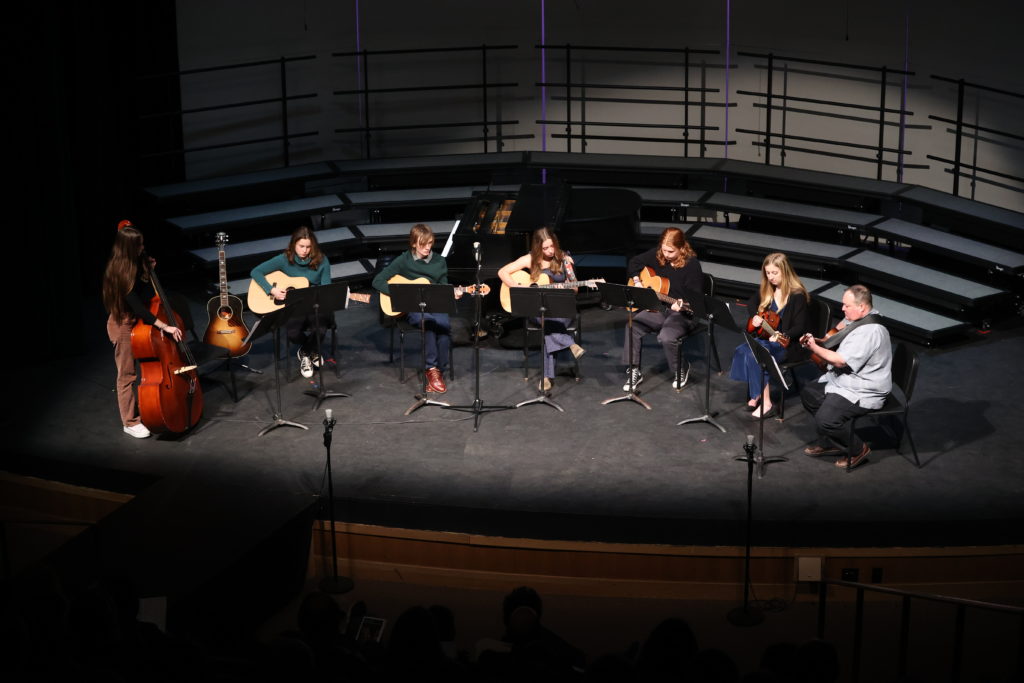
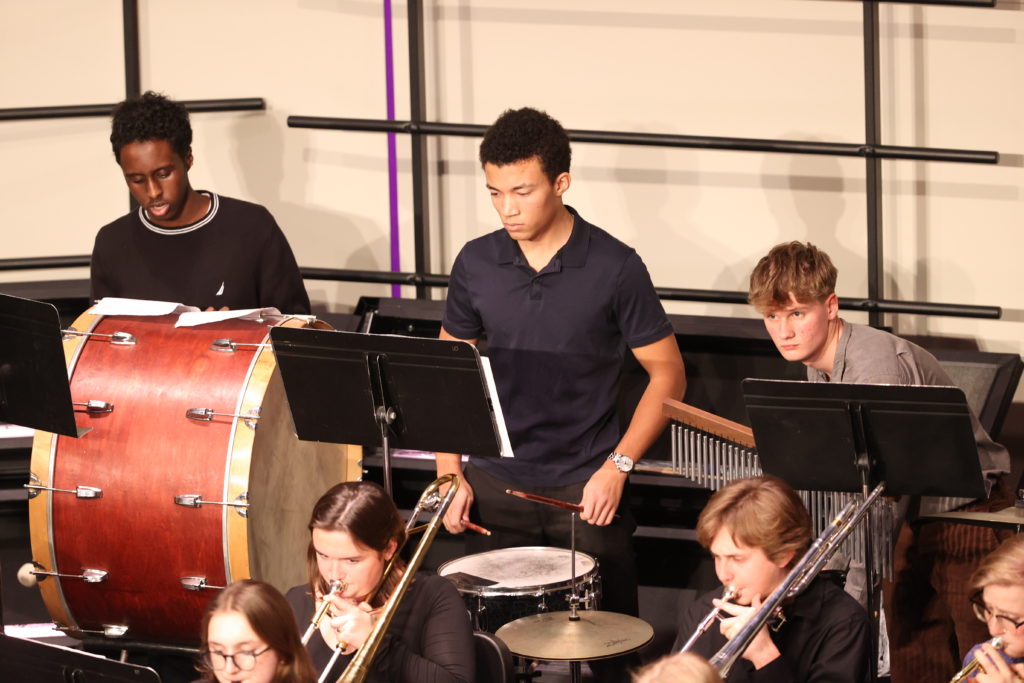
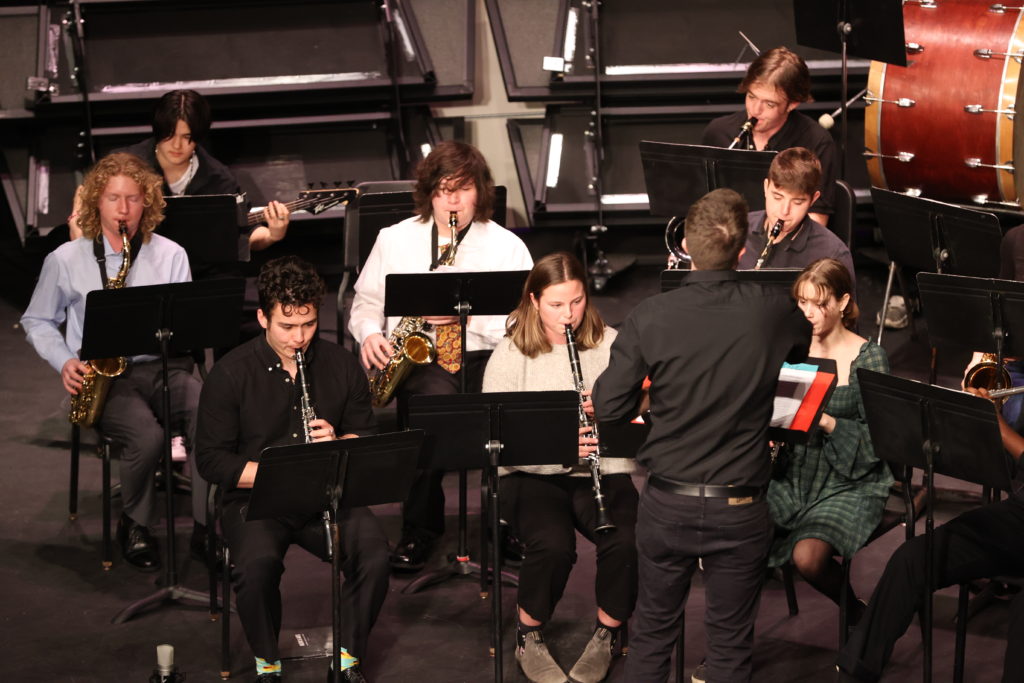
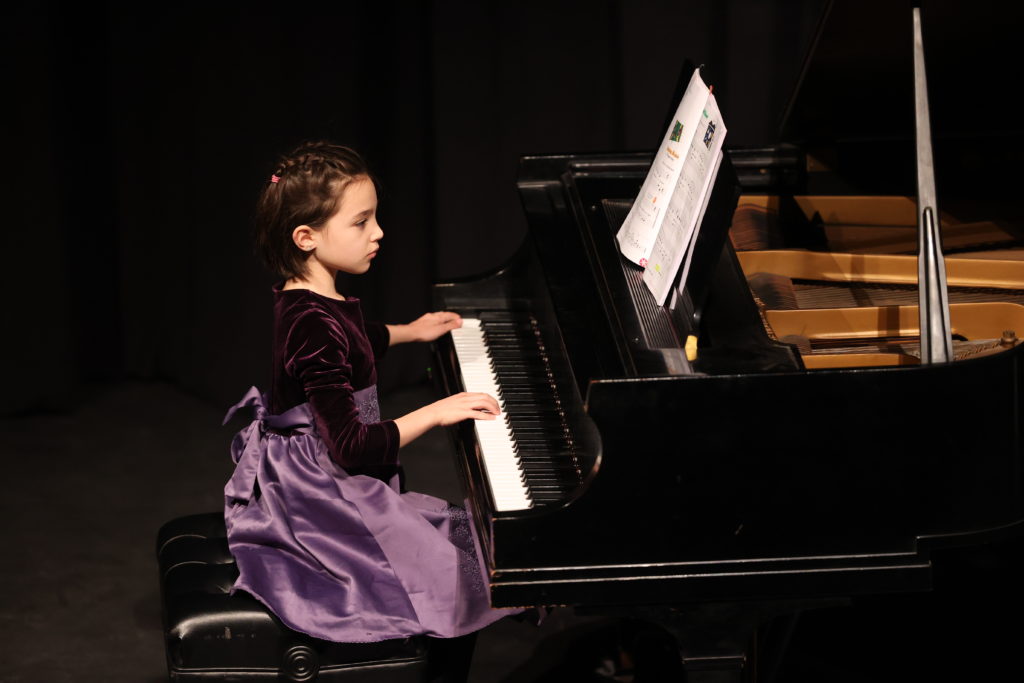
Students in grades 2–3 engage in a yearlong maritime study
Students in grades 2–3 began the year with the question, “What does it feel like to be near or in the ocean?” This sparked a discussion about social justice standards (justice, identity, diversity, action) as they relate to students’ prior experience (or lack thereof) with the ocean and encouraged students to think about the world’s oceans from a global standpoint. The maritime study provided several exciting field trip opportunities. Students explored tide pools at Kettle Cove, practicing their observation skills and collecting creatures to study in their classroom saltwater tank. They took a ride on the Lucky Catch after studying lobster fishing. Students learned the basics of nautical communication, created their own signal flags, and even visited Portland Head Light to learn more about lighthouse characteristics. Stay tuned to see where this maritime study will bring us next!
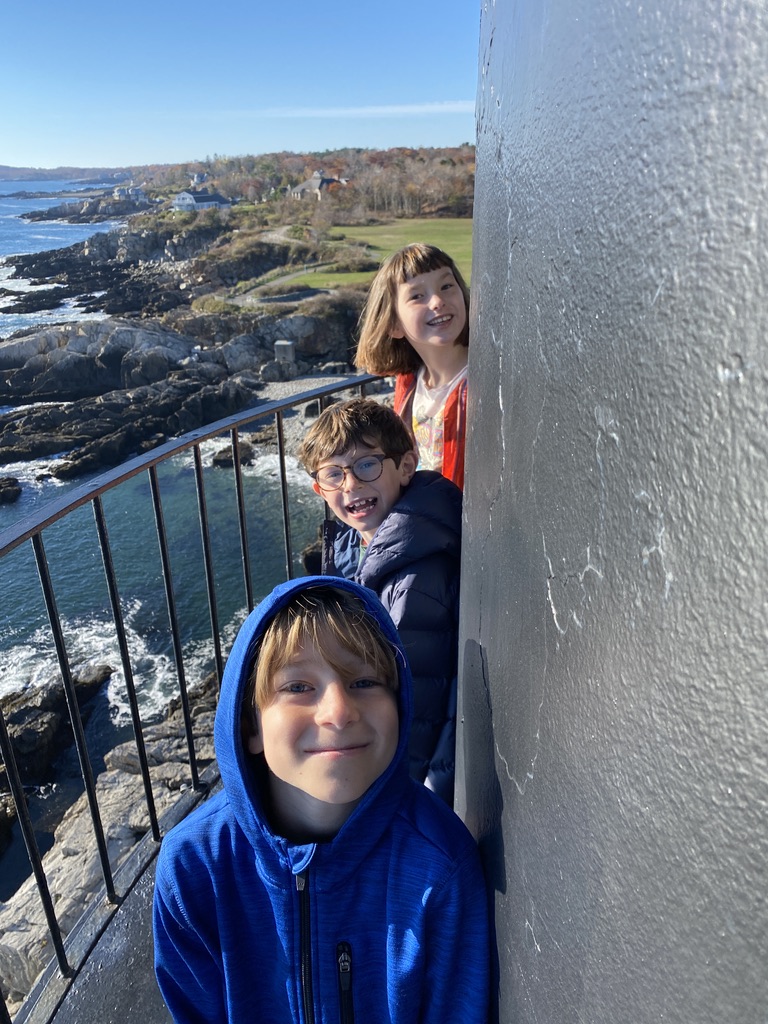
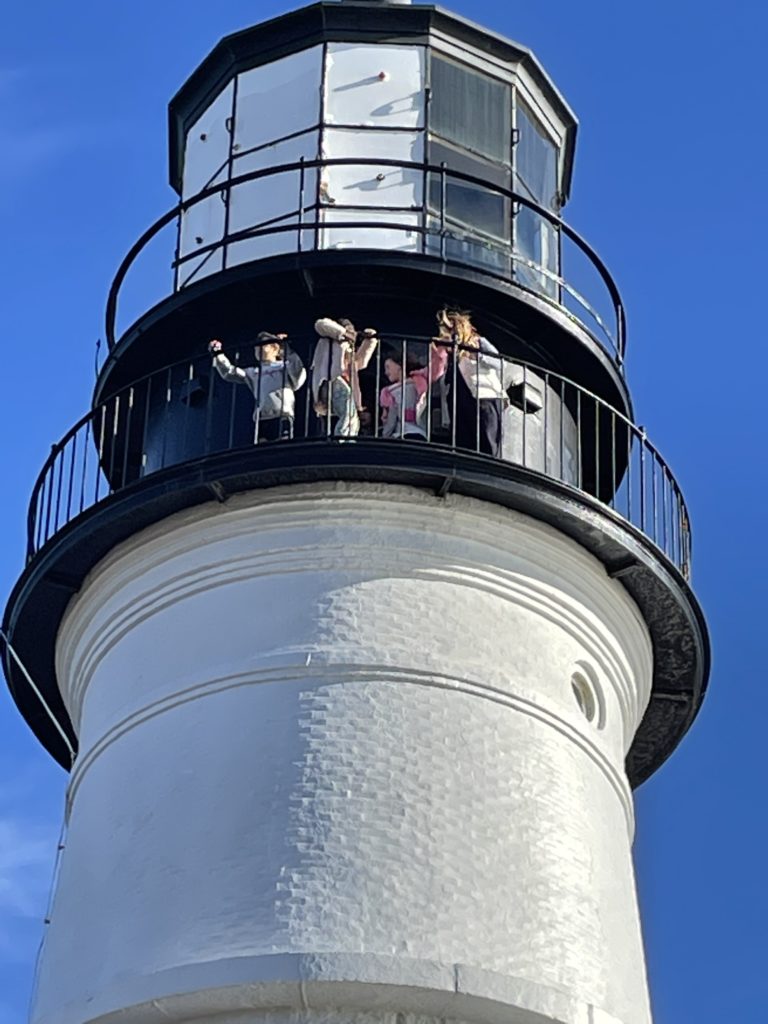
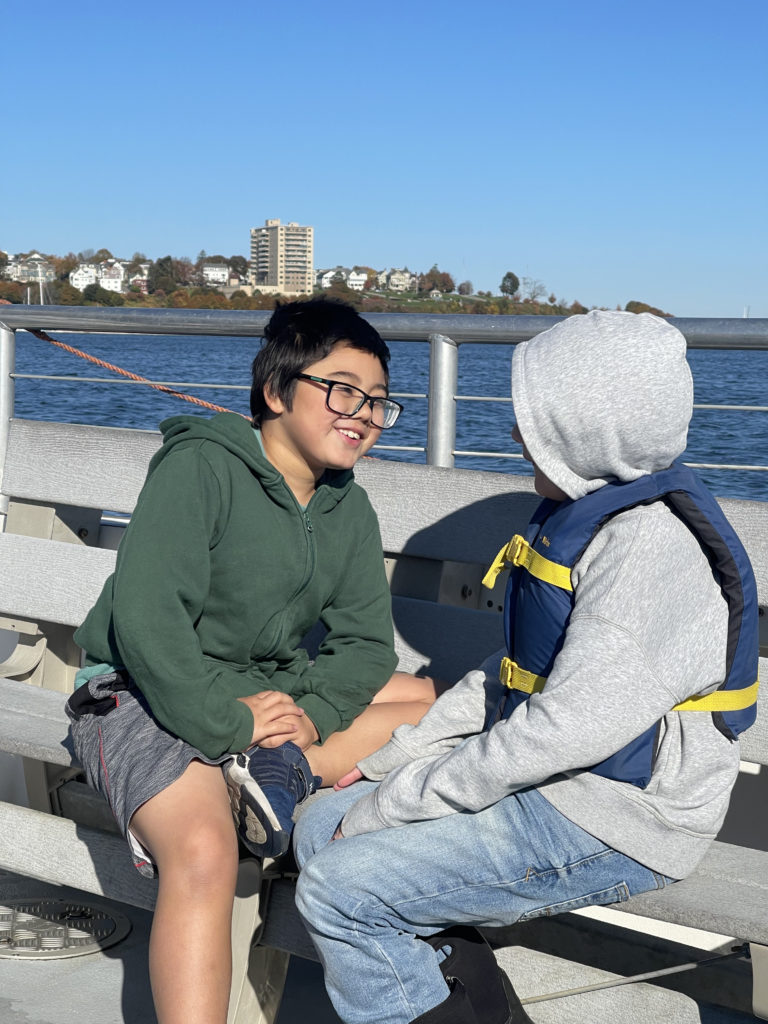
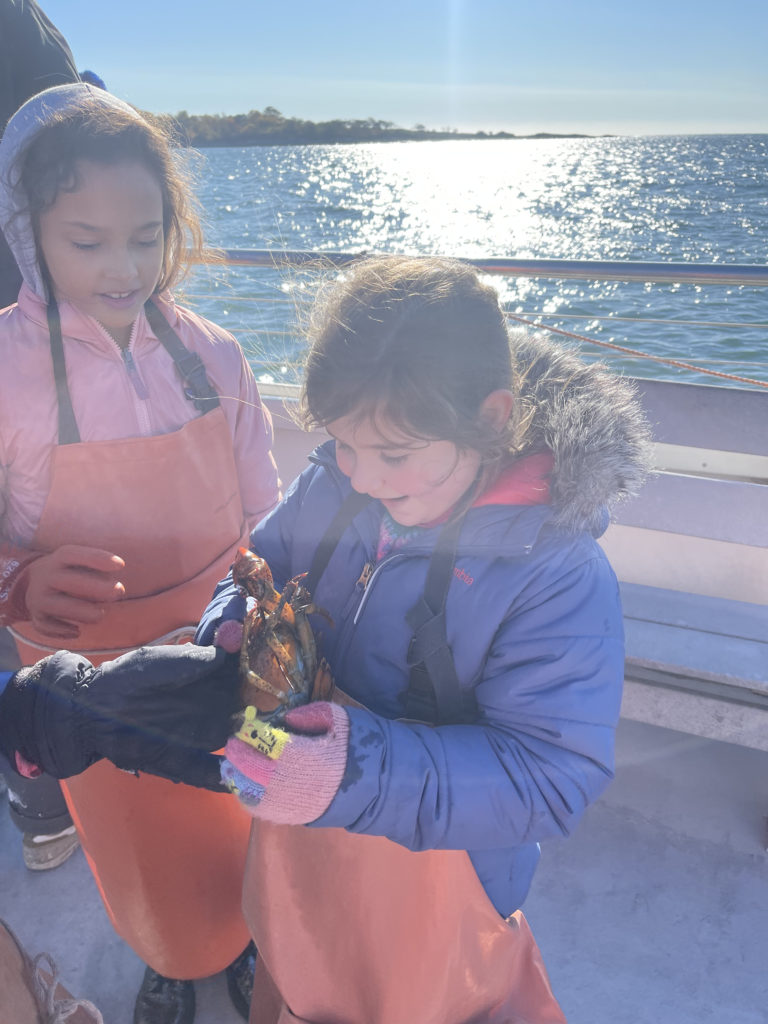
Upper School students speak with representatives at the State House
Students from Maine independent schools gathered at the State House today to connect with representatives. Waynflete seniors are pictured standing with the Speaker of the House, Waynflete alumna Rachel Talbot Ross ’78.
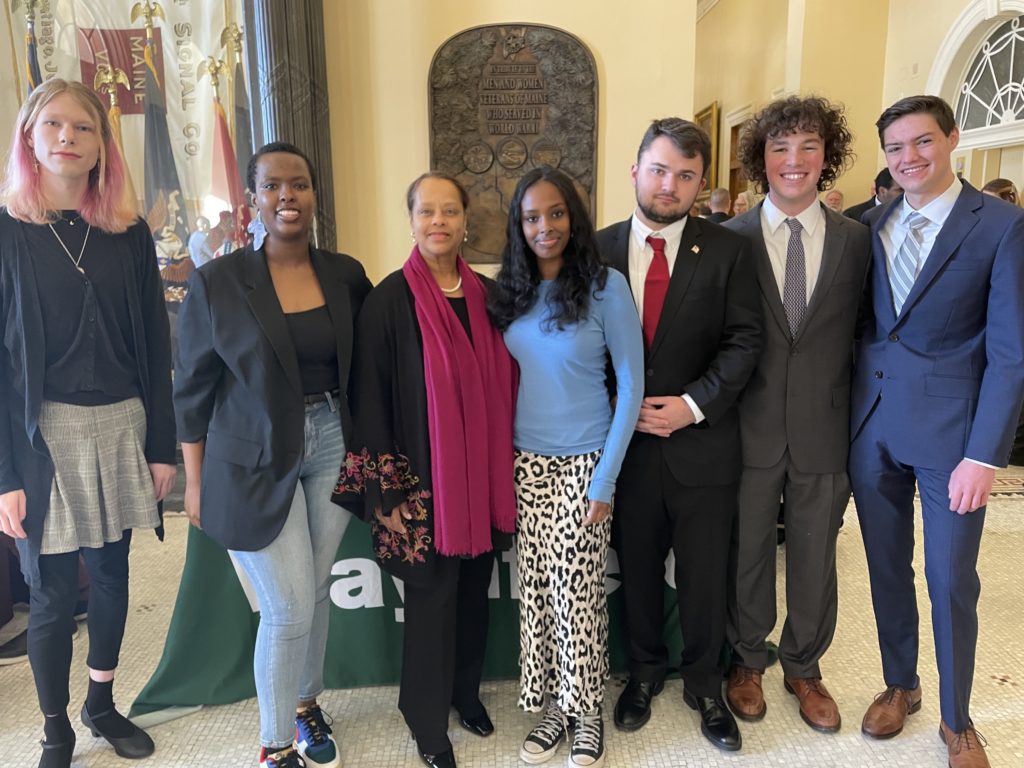
Thematic studies drives new Middle School curriculum planning
Despite all its harm, the COVID-19 pandemic drove many school administrators and teachers to explore new opportunities for pedagogical innovation. At Waynflete, Middle School Director Divya Muralidhara sought out fresh ideas to make the school’s grades 6–8 program more interdisciplinary, more interconnected, and more interdependent, leading to greater cohesion during the academic year and across grades. With support from Head of School Geoff Wagg, Divya determined that this change would take the form of “thematic studies”—major themes for each of the three grade levels that would serve as the foundation for curriculum development.
After soliciting initial feedback from the entire Middle School faculty, Divya established a five-person committee in March 2022. The group comprised both new and seasoned faculty members who were passionate about the thematic studies concept and eager to think beyond their own academic disciplines. Divya granted the team significant autonomy to shape the loosely formed concept into a sequence that would enable teachers to build on the material taught in earlier grades. “I put my name in because I love this kind of synthesis thinking,” recalls Cassie Pruyn, an English teacher who served on the committee. “I was interested in the process of connecting all these different ideas.”
Following the April break, committee members worked with Divya to put the final touches on the draft themes prior to a faculty presentation in May. “I loved what I was seeing in terms of the committee’s connection,” Divya says. “They were energized as a group, and there was real value in their debates and discussions.”
A preamble to the introduction of the themes explains that they were designed “to awaken the imagination, deepen curiosity about self and community, provide space for reflection and inquiry, and broaden one’s sense of the world.” Inspired by Maslow’s hierarchy of needs, the sixth-grade theme, “Adapt, Survive, Thrive,” explores how needs have driven humans to invent and innovate, how civilizations around the world have found different ways to meet their own needs, and how the design of our bodies (and understanding of our identities) reflects adaptations to the needs of survival.
Grade 7 students broaden their outlook in their theme, “Exploring Home.” Students ask: What do home and community mean to me? How can understanding the role of community make us more empathetic to each other? How does listening to each other’s stories strengthen our community? What responsibility do we have for protecting and nurturing our planet?
Finally, in eighth grade comes the most dramatic theme of all: “Change: Destruction, Transformation, Creation.” “We thought a lot about the word ‘destruction,’” says Cassie. “We knew that it might have a negative connotation for some. But it’s an exciting word. We wanted the students to be thinking, ‘What would I do differently?’” Students spend the year exploring how they can harness forces of change to reinvent themselves and the world around them. How must we challenge the thinking of the architects of our societal structure to address profound injustices? How can our passions and leadership skills motivate us to act in the face of challenges and uncertainty? How can we effectively engage with each other to bring about change?
The themes become more abstract as students progress through the three grades, meeting them where they are developmentally and ultimately preparing them for a successful transition to the Upper School. Committee members sought to strike a difficult balance—to create a curriculum-building framework that wasn’t stiflingly specific yet not so broad as to be “mushy” (i.e., too easy to connect anything to the theme). “It would have lost some of its tension,” says Cassie. “The idea was to create openings through which someone teaching in any department or discipline could connect.”
Middle School faculty discussed the proposed themes in small groups and provided feedback to committee members. “There was a great amount of respect and appreciation” for the work of the committee members, says Divya.
As the end of the academic year approached last spring, grade-level teaching teams met in workshops to start sketching out potential changes to the curriculum that would incorporate the new themes. While complete overhauls were not expected in the first year, faculty members were asked to connect some aspects of their classroom content to the themes. Stipends were made available to some teachers who were interested in significantly revising their curricula. “Teaching feels so urgent all the time,” says Cassie. “The pause of the summer and the stipend were really valuable. I was able to plan virtually the whole first trimester.”
These programmatic changes were also intended to open up new opportunities for cross-departmental collaboration. “We need to meet the highly integrated brains of our middle schoolers with a highly integrated program, one where knowledge is not treated separately but as connected,” says Divya. This was already happening to a limited degree. English teacher Alyssa Goodrich and history teacher Hannah Walton had sought out common threads in their curricula and designed a shared theme of courageous citizenship. Science teacher Stephanie Dolan and visual arts chair Jona Rice had collaborated on an exploration of the scientific applications and artistic uses of light. The faculty wanted to push further, however. “Authentic engagement with the themes will lead to authentic interdisciplinary connection,” says Cassie.
Lisa Libby’s sixth-grade biology class already lent itself well to the theme of “Adapt, Survive, Thrive.” “It’s embedded in pretty much everything I teach in that class,” she says. All great teachers appreciate the opportunity to rethink their curricula, however, so the idea of collaboration was top of mind for Lisa as she worked over the summer. While she was designing a new unit on structural and behavioral adaptations in animals, an idea began to crystallize: What if students were asked to design an imaginary animal, out of whole cloth, based on a set of randomly assigned traits and adaptations? A call to colleague Kim Farr, a visual arts teacher, resulted in a plan for the coming school year. After the six-graders created “new” animals (and their habitats) in science class, Kim would help them extend their work into the visual arts realm. How can you demonstrate traits and behaviors through illustration? And how do you draw convincing feathers and talons?
“The themes can serve as a through line across all courses,” says John McDevitt. “This is particularly important for sixth-graders, who have a different teacher in every subject for the first time in their lives.” As seminar teacher, John occupies the unique position of being the only faculty member to instruct every middle school student over the course of an academic year on a range of developmentally appropriate topics ranging from self-awareness and self-management to social awareness, relationship skills, and responsible decision making (he also provides counsel to faculty members on advising activities). “Everyone is focused right now on how to use the themes to guide what we do in the classroom,” he says. “But we’re already having some great conversations about how we can do more to incorporate the themes into advising.”
It’s been a successful first year. History teachers are leading their classes in discussions about ancient civilizations that thrived through innovation and adaptation. Students have examined the concepts of destruction and transformation during their units on the Reconstruction era, the Jim Crow era, and the civil rights movement. Seventh-grade students have studied Indigenous peoples of the United States, learning that everyone has a sense of home, regardless of where it is. (A unit on Ukraine led to a discussion about what happens when your city or nation is taken away from you and how this could affect your sense of belonging.) English classes have explored how our essential needs catalyzed the invention of stories—what power do stories hold, and how have they changed us over the course of human history?
Eighth-grade Spanish students have discussed what it means to leave a place that has always been home and the reasons why we might be forced to leave. In PE class, students have explored how our movements influence those around us and how we can coexist in tight spaces. And while robotics classes are fundamentally about creation and transformation, thematic studies have pushed the curriculum further. Students have examined how the field has both created new possibilities and destroyed certain jobs.
As the first year of thematic studies draws to a close, Divya and the Middle School faculty will soon meet to share their successes, provide support to those who are looking for innovative ways to connect themes to the curriculum, and explore ideas for more widespread collaboration between teachers next year. “Our students will be going into Upper School with a different sensibility around knowledge and understanding than perhaps they’ve had before, because of how intentionally we’re teaching these ideas and questions,” Divya says. “There is real potential to continue this approach of essential questions informing every aspect of our teaching and our work with young people. I think that we live in a world where finding commonality is an essential part of the journey of life.”
Lisa concurs. “Making a curriculum that is cohesive and interconnected means we’re all moving toward the same goal,” she says. “That framework just makes sense to me. I’d like to think that it makes sense to the students, too.”
Pictured above: Thematic Studies Committee members David Jaffe, Nicole Wiesendanger, Heather Courtice Hart, Divya Muralidhara, Cassie Pruyn, and Nat Silverson.
Early successes in first year of Waynflete’s debate program
“The skills students develop doing debate—organizing their thoughts, learning how to present, and arguing a perspective that might be different from their own—are essential building blocks to being a citizen of the world,” says Head of School Geoff Wagg. We sat down with debate coach and English teacher Sarah Getchell to learn more about Waynflete’s new debate program.
How did you get involved in debate?
My first experience was on an internal team at Colby College. I couldn’t compete, unfortunately, because I was a two-sport athlete. My interest in debate, and in current events generally, led me to law school at the University of Michigan. I taught English literature to undergraduates during this time; it was also when I figured out that I wanted to be a teacher. After practicing law for a year, I entered the independent school world as an English teacher and residential life team leader at Worcester Academy. It was at Buckingham, Browne and Nichols School (BB&N) where I got my first taste of speech and debate coaching. The students on the BB&N hiring committee saw that I had attended law school and asked if I would be open to being their debate coach. Without knowing what I was getting myself into, I said, “Sure!”
I coached at BB&N for six years. During that time, the team grew to more than 30 students and we brought on an assistant coach. We built a student-driven culture that focused on being inclusive, being open to experimentation, and having fun, not winning (which paradoxically may have led to much more winning!). I didn’t pretend to be an expert in the first couple of years—I was learning along with them. We made sure to debate sensitive topics in an informed and thoughtful way. Toward the end of my time at BB&N, the team won the International Independent School Public Speaking Championship and consistently placed at the independent school tournaments.
What opportunities do students have to participate in debate at Waynflete?
Debate is offered as an Upper School activity. We meet at least once a week but try to find other times as well, particularly as we approach tournaments. We compete in two different leagues for speech and debate: the Maine Forensics Association, which is for all Maine high schools, and the Debate Association of New England Independent Schools. We will also participate in the Maine Model UN Conference (MeMUNC) hosted by USM. It’s possible that we could offer additional programs in the future if we’re able to add an assistant coach.
Debate programs are important because there are kids out there who want options for competition that aren’t athletic. Debate also gives kids the opportunity to find their voices and to discuss important issues with nuance and respect, which complements the advising program and social-emotional learning curriculum.
Waynflete is often characterized as a progressive school. Do debate programs help students see both sides of an issue?
This is the great thing about a speech and debate team. It’s not as hard as you might think to discuss both sides of a hard issue, as long as you lay out clear ground rules for students. The kids know that a fundamental aspect of the team’s culture is experimenting with defending arguments that they don’t agree with. For some types of debates, you flip a coin—the side that wins gets to choose either the topic or the side. The kids frequently end up having to take stances that they don’t personally believe in. This might push them to challenge their own beliefs, to recognize the validity of another viewpoint, or to use rhetoric to better defend their own point of view.
The kids’ ability to engage with each other and to develop their own arguments (and successfully refute those of their opponents) is incredibly valuable. We watched some political debates together last year. Students observed that these really aren’t debates—they’re just an exchange of talking points, and the candidates rarely respond to each other. They saw that on the debate team, they were more willing to approach discussions and opponents with respect…and to listen. These are skills that everyone on the team will gain, skills that politicians at the highest level often seem to not possess.
Waynflete’s mission includes the goals of encouraging our students’ “responsible and caring participation in the world.” How will the skills developed on the debate team be important to our graduates?
These skills will help students become engaged citizens. As tournament administrators, we always try to pick topics that are relevant to current events today but that also allow students to learn about history. These can range from resolutions about war in Syria to the territorial claims in the South China Sea to whether the US should intervene in various conflicts. But there can also be more philosophical topics. For example, Branksome Hall, an independent school in Toronto, asked students around the world to write and deliver speeches on the prompt “We can appreciate art, even if the artist is personally reprehensible.”
Is there a connection between being a great debater and a great writer?
A great writer is not necessarily a great debater. But a great debater is more often than not a great writer. Engaging in this kind of activity requires organization, precision, rhetorical flair, and depth of analysis. The act of preparing for a tournament really helps students with their writing.
There are a few competition categories that require students to write and deliver speeches. One of our students recently placed fourth in Internationals (her first-ever international tournament) with a persuasive essay about water conservation. For the persuasive speech category, students identify a significant problem and propose a solution. She wrote a 12-minute speech, memorized it, and delivered it in an incredibly compelling way in front of a large international audience and judges from three different countries. You have to be a good writer to win a speech-writing event; we work closely to develop the writing skills of all debaters who are interested in dabbling in the world of speech. Some of my strongest former student speech writers didn’t start out as particularly skilled writers, but they worked at it and made amazing gains.
Impromptu speaking is another event with which our students have had a lot of fun. In tournaments, they have to pick one of three topics they receive on a slip of paper, take two minutes to prepare a three-to-five-minute speech, then deliver the speech. As you can imagine, there is often a big difference between the kids who enjoy writing and memorizing a 12-minute speech and those who like to think on their feet, responding to a prompt off the cuff. I encourage students to try both impromptu and prepared events, and the major international tournaments we participate in require that they do so.
What are your hopes for the future of the program?
Mainly I hope for a really diverse team and for all Waynflete students to feel like there is a place for them on the team, regardless of their confidence in their speaking and debating abilities. Students have lots of different motivations for joining the team. Some report that they’re just looking for another stage on which to perform, some want to learn how to win arguments, and others say that they’re on the team because they want to gain confidence in public speaking. I hope that no matter where the kids think they are in terms of rhetorical skill, desire to compete, or knowledge of political topics, they all feel like there’s a place for them on the team.
I also want them to be able to do all the other things they’re interested in. You can be an actor, you can be an athlete…I want them to be able to do all that and not be shut out of debate. That’s one of the beautiful things about independent schools. You can experiment with all sorts of things outside your comfort zone or your realm of expertise.
Finally, while they’re building their public speaking and writing skills, and debating challenging topics, I want them to meet and interact with kids from all over Maine and around the world—to take advantage of the opportunity to talk about issues and to hear ideas from kids from many places who have different backgrounds and political views from their own.
CALLOUTS:
Aelia Russell ’24:
One of the aspects I appreciate about debate is how exploratory it can be; we get introduced to issues we may not have formulated opinions on, and we are asked to imagine the effects this problem has on different systems and people. We also get to hear the perspectives of other debaters, from our own school and from around the world, who all bring different contexts to the issue. Even though it’s a competition, hearing other debaters’ speeches and impromptus is an opportunity to make connections and to challenge our own ideas.
For me, the opportunity to practice taking a step back from my own beliefs and forming a compelling, genuine argument for the other side of the issue, sometimes with little time for preparation, is really valuable—debating encourages me to explore other perspectives and practice speaking with confidence to convince others. It also requires me to be vulnerable to allowing my own mind to be changed. I think these are powerful skills to practice for navigating the real-world issues we are facing, especially those with intersecting problems and complex solutions. Now that debate tournaments are back in person and our team has grown, I’m excited to debate with teams at other schools, meet more people, and keep practicing together as a team.
Miles Sims-Kastelein-Henry ’24:
Debate encourages a change in perspective, allowing me to connect with others and have opportunities I wouldn’t have had otherwise. Speech and debate have challenged me to break out of previous mindsets and analyze issues from every side. Attending competitions like the International Debate competition has helped me grow both as a student and as an individual by practicing skills like public speaking, analytical thinking, and unconditional confidence. These opportunities have been invaluable.
Physics Intensive students compete in a fun design contest
As students in Physics Intensive learn about momentum and collisions, one of the primary goals is to understand how to minimize the forces experienced in a collision. To better understand the principles involved, students were given the task of designing and building a container that could protect an egg during a three-story drop. Students were allowed a maximum of 30 straws and scotch tape, but no section of tape could span more than 5 cm in any direction. Congratulations to Kineo Sommers ’24, Jack Vickery ’24, Yuting Wang ’23, Aelia Russell ’24, and Will Barmby ’24 for their winning designs!
The SpongeBob Musical had a spectacular opening night!
The SpongeBob Musical takes us on a journey to the colorful world of “Bikini Bottom” where we find SpongeBob Squarepants, Patrick Star, and Sandy Cheeks bravely trying to save their beloved underwater realm from certain destruction! Our Upper School students had a truly fantastic opening night. They sang and danced their way to the top of Mount Humongous and back in a tale of friendship, courage, teamwork, and caring for our world and one another—and received glowing reviews in the process!
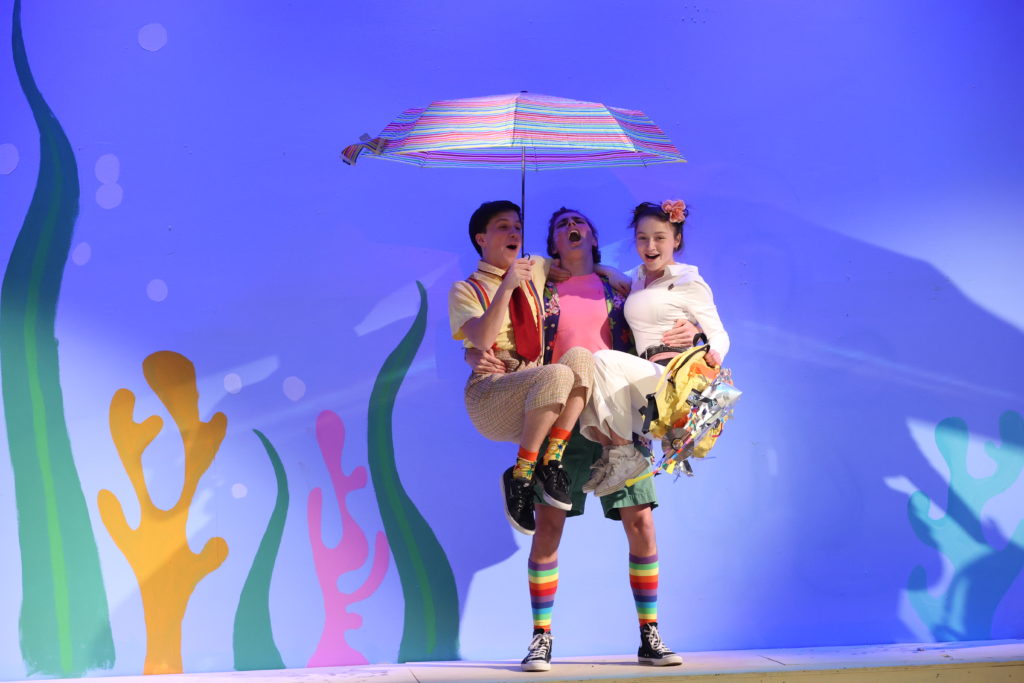
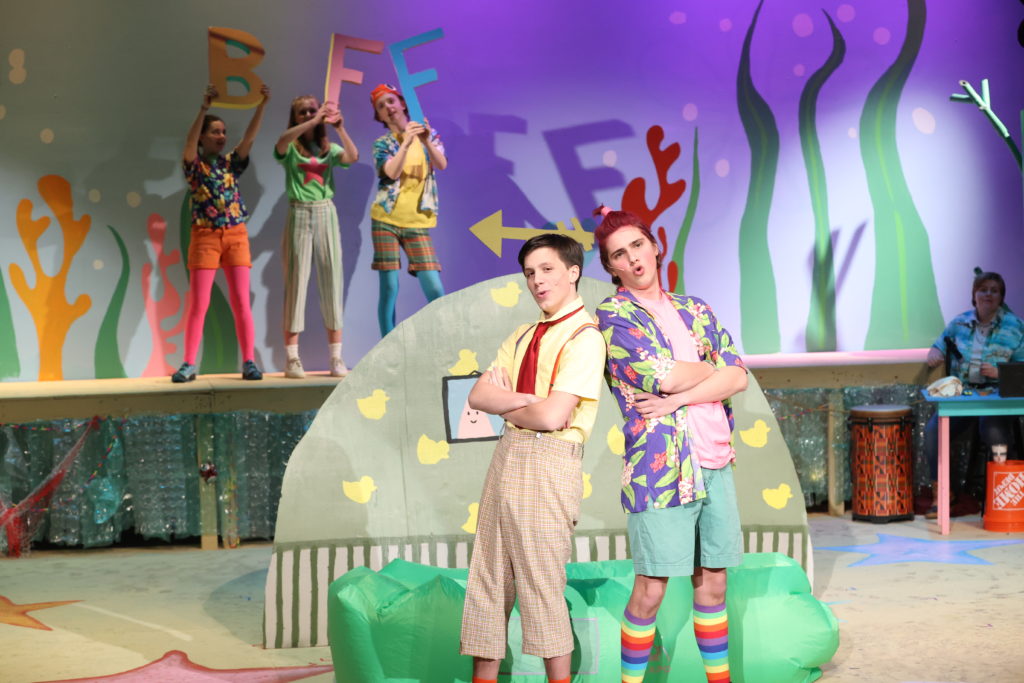
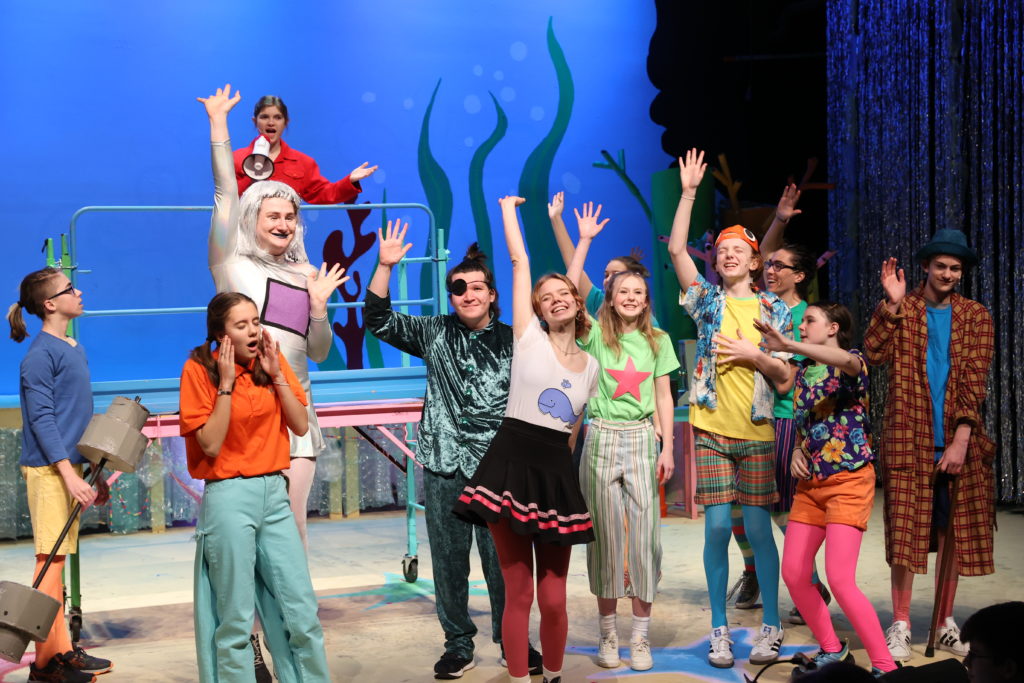
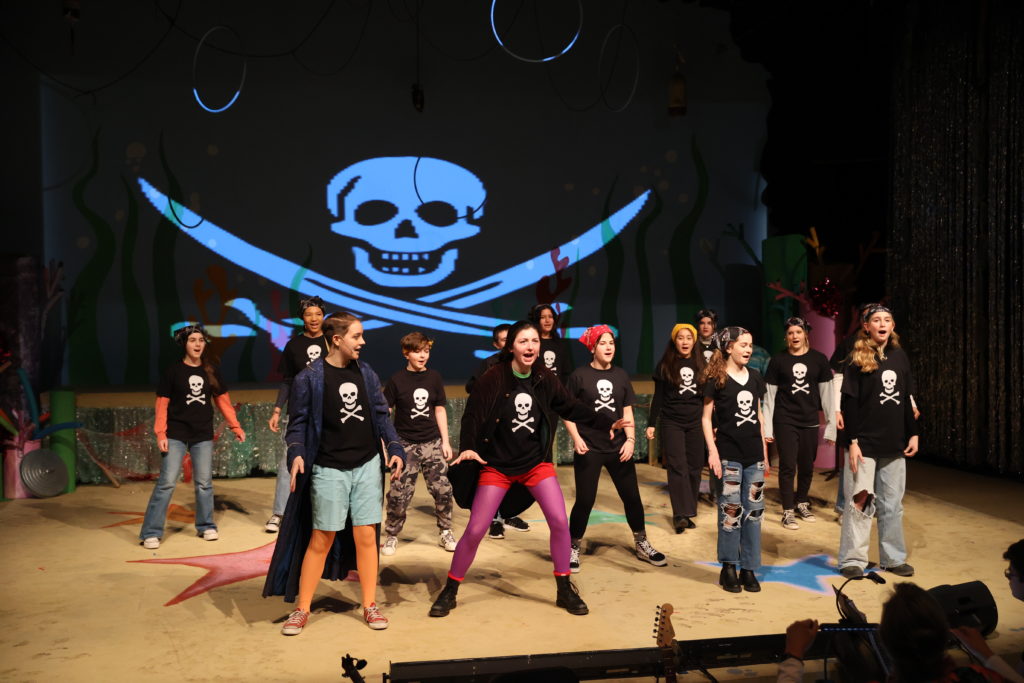
Max Polsky ’23 gave an impressive performance in the Jazz All-State ensemble
Congratulations to Max Polsky ’23 who recently performed as a part of the Jazz All-State ensemble at Bangor High School. This nine-person ensemble spent three days rehearsing and learning about improvisation and jazz history.
Waynflete Writers’ Guild releases January 2023 issue of “The Wombat”
Read the latest issue of the The Wombat from the Waynflete Writers’ Guild!
Owl artwork: Anna Siegel ’24
Waynflete teams up with Windham at recent Can We? Project retreat
We were thrilled to have our friends at Windham High School participate in our most recent Can We? Project retreat! The Can We? Project is an experiment in revitalizing democracy centered on developing the capacity of high school students to engage in dialogue across differences. Students work with experienced facilitators to learn how to talk across deep divides, develop a shared vision of a better Maine, and design an interactive forum with political leadership. Students are asked to question their own ideas, challenge each other, and collaborate. In the process, they develop basic democratic skills that seem lost in this divisive moment: valuing dialogue, mediating differences, holding elected officials accountable, and working collectively for a higher purpose. Partners include The Maine Policy Institute, Narrative 4, Camp Sunshine, and a wide range of high schools.
Chinese language students celebrate the Chinese New Year
Chinese New Year—or Spring Festival—is China’s most important holiday. This year, the Year of the Rabbit, the celebration began on Sunday, January 22. Our students spent a week studying the traditions of this holiday in our Middle School Chinese classes.
The eighth-grade students recently shared what they’ve been learning during assembly. They introduced the customs and legends of the holiday and even performed a traditional Dragon Dance!
The Perspective Project hosts youth climate activists
Charlie Horner ’23 and Liam Anderson ’23 recently hosted climate justice activists Anna Siegel ’24 and Madison Sheppard as part of The Perspective Project’s first youth-based event of the year. This discussion encouraged students to think critically about climate change, challenged them to use other perspectives to enhance their own understanding of the issues, and helped them begin to bridge divides within and beyond our classrooms and communities.
Identity, diversity, justice, action, and bats: social justice standards in the Lower School
Anti-bias teaching has long been an essential component of Waynflete’s curriculum. Faculty member Kate Ziminsky recalls that when she began her tenure at the school in 2004, organizations like Teaching Tolerance were already hard at work helping teachers address justice and equity issues in the classroom. Social-emotional learning; culturally responsive teaching practices; differentiation; and diversity, equity, and inclusion have also emerged as important considerations for curriculum planning. “As educators, we were taught to differentiate primarily based on a child’s learning profile,” Kate says. “We now understand that considering all the characteristics of a student’s identity—including their culture and family structure—is what offers them more equitable access to learning.”
Today, “social justice standards” have an increasingly prominent impact on programming in schools across the country. The standards are a product of the Southern Poverty Law Center’s (SPLC’s) Learning for Justice affiliate, whose staff work in partnership with educators, students, caregivers, and communities to advance the rights of everyone through the domains of identity, diversity, justice, and action. They provide a common language and organizational structure; according to the SPLC, “teachers can use them to guide curriculum development, and administrators can use them to make schools more just, equitable, and safe. The standards are leveled for every stage of K–12 education and include school-based scenarios to show what anti-bias attitudes and behavior may look like in the classroom.”
Waynflete educators were first exposed to the social justice standards at an Association of Independent Schools of New England conference in April 2021. Lower School Director Anne Hopkins, Kate, and other faculty members attended a workshop that explored the process of integrating the standards into a K–12 school curriculum—introducing them to teachers, defining learning objectives, and developing guiding questions. The session was run by staff from Rise DEI, a consultancy that provides professional development training in the areas of systemic equity, restorative justice, and culturally responsive pedagogy.
The value of the social justice standards initiative was immediately evident to Waynflete’s conference participants. “Our goal with students is to grow a confident and secure sense of self, but also an understanding and appreciation for others,” says Anne. “I saw that the social justice standards framework could help children understand their relationship with others in our community and teach them how to be caring citizens—not just at Waynflete, but in Portland, in Maine, and across the world.” Supported by a toolkit and road map from Rise DEI, Lower School faculty began the work of building the standards into the curriculum for the upcoming school year.
Bats!
As September approached, Stacie Thomas and her colleagues in Waynflete’s kindergarten/grade 1 (K–1) program were busy planning for the first semester. This work is increasingly driven by “backward design,” an approach to programming that identifies desired results at the outset, determines “acceptable evidence” (i.e., how teachers will know if students have achieved the desired results and met the standards), and concludes with the planning of instruction and learning experiences.
Guiding the teachers in their planning this year are the recently crafted essential questions for K–1: What do I need to live a happy, healthy life (identity standard)? What do others need to live a happy, healthy life (diversity standard)? What gets in the way of all living things experiencing a happy, healthy life (justice standard)? And what can I do to ensure that every living thing lives a happy, healthy life (action standard)?
One of the K–1 program’s first units would be an animal study. While teachers come prepared with a candidate in mind, they are also on the lookout for, as Kate puts it, “a passion, a flame that comes up” in the classroom (this openness is a key tenet of the emergent curriculum, a pedagogical approach in the younger grades where children play an active role in determining the curriculum path). K–1 students made their choice clear: this was the year for bats!
An intriguing aspect of the social justice standards is that they can be integrated into any subject-matter or discussion, from literacy and mathematics to science and creative movement. A study of bats is no exception. K–1 advisors and Lower School content area specialists flew into action, designing a curriculum that would accommodate student interests while ensuring that learning objectives would be met. Over the course of the semester, the class would explore bat anatomy, adaptations, habitats (including through a trip to Maine Audubon), food sources, family structures, and threats. All the while, teachers were skillfully weaving in elements of the social justice standards’ essential questions. What does a bat need to live a happy and healthy life, anyway?
“They turn into vampires!” “They drink blood!” “Eww!” There was some understandable trepidation in the classroom as the unit began. Like wolves and sharks, bats are fascinating creatures that are frequently misunderstood. Enter Kate, who is uniquely talented at transforming children’s fear of the unknown into a state of wonder. While Kate currently serves as a faculty support coach for Responsive Classroom; social-emotional learning; and diversity, equity, and inclusion (and has worn many other hats at the school over the years), she was previously a natural history educator and wildlife researcher/rehabilitator. “You mention anything about the natural world, I’m in,” she says. “In this case, I was able to help make the connection between the class’s learning objectives and the social justice standards framework.”
Students were transfixed by Kate’s lessons, learning that bats are the only flying mammals, that they have thumbs and fingers that resemble our own hands, and that there are almost 1,500 different species (and most of them are endangered!). More importantly: do you know how many mosquitoes bats can eat in an hour? “Kate is just so good at helping to get rid of scary myths,” says Stacie. “She helped the kids understand all the reasons why bats are wonderful and all that they do for our environment—and that they’re not going to hurt you.”
One of the defining features of Waynflete’s Lower School is the close coordination between classroom teachers and specialists in related disciplines such as visual arts, the library, music, creative movement, Spanish, and physical education. While colleagues meet on a regular basis to discuss collaboration, opportunities often emerge organically during the school day. “Our responsibility in the Lower School is to create a connected, interdisciplinary experience for students—it’s what makes Waynflete unique,” says Anne. “Our grade-level teams regularly discuss how to make this happen.”
Mary Rehak has been including bat studies in her visual arts curriculum for more than 15 years (bat artwork provides her with an excellent opportunity to assess children’s drawing and cutting skills). With the introduction of the social justice standards this year, Mary created an updated lesson plan that served as a platform for students to explore how creatures like bats are commonly misunderstood due to their appearance, and how painful it can be to be maligned, ostracized, or excluded. “That cry for help creates a social-emotional connection for K–1’ers,” observes Kate, who worked in concert with Mary. “You see that feeling starting to develop—‘yeah, we’ve got to help them!’”
From librarian Laurel Daly’s perspective, the timing of this year’s bat study was serendipitous. One of the nominees for the annual Maine Chickadee Award (a book award selected by Maine students in grades K–4) is Amara and the Bats. Under Laurel’s direction, students explored the differences between bat fiction and nonfiction, then created bookmarks that incorporated what they had learned about helping bats. They shared their creations with their grades 4–5 buddies—an example of the social justice standard of “action.” Fears had begun to dissipate by the end of the unit, with some students declaring that “bats were actually kind of cute.”
. . .
Waynflete’s mission calls for encouraging students’ “responsible and caring participation in the world.” While this work becomes more visible in Upper School, as demonstrated by The Can We? Project and The New England Youth Identity Summit, it takes place in a developmentally appropriate way in all grades. Introducing concepts like the social justice standards at an early age helps children become, as Kate puts it, “individuals who want to engage with their communities and with each other to enhance the human experience.”
For Laurel, the standards dovetail with the natural progression of young people—from seeing the world from their own perspective to “seeing the world in a wider way, not with themselves as the center, but rather as being one of many.” She observes that it is empowering for young children to recognize injustice, to know that they have the ability to be change makers, and to have the capacity to educate others.
“The social justice standards support the lenses of diversity, equity, inclusion, and belonging in a very age-appropriate way,” says Anne. “The goal for all of us in the Lower School is to create a sense of belonging so that, together, we can be the change in the world that we want.”
Learn more about the social justice standards

